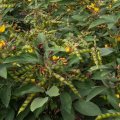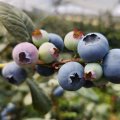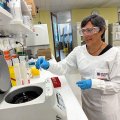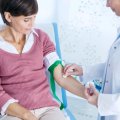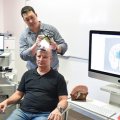New approaches to cancer treatment and improved nickel mining output were the winning ideas from the grand final of UniQuest’s annual Trailblazer competition held at The University of Queensland on September 4.
A UQ Diamantina Institute team led by Dr Fiona Simpson won the staff category, and plans to use the $25,000 in prize money to develop a new diagnostic tool and drug candidate for Squamous cell carcinoma, a type of skin cancer affecting more than 80,000 Australians every year.
Patrick Littlejohn from UQ’s School of Chemical Engineering won the $25,000 student prize for his new method to recover valuable metals from mine waste.
Mr Littlejohn’s idea could add up to 5 per cent to the yearly production of nickel (or $20-40 million) that is presently lost to waste and toxic environmental liability.
UniQuest Managing Director David Henderson said Dr Simpson and Mr Littlejohn were among 14 Grand Finalists who competed for the prize pool of $50,000 in cash prizes to further their research careers.
“This year we introduced a 'People's Choice’ segment to the awards ceremony, which meant the audience had the opportunity to hear about 14 exciting innovations emerging from university research, then vote for the pitch they believed conveyed the most brilliant idea,” Mr Henderson said.
“Our Trailblazer Grand Finalists this year included undergraduate students and internationally renowned academics, so although there was a mix of pitching experience, they all shared a tremendous passion for their research aims, and that came across very clearly in both the panel-judged pitches and the People’s Choice Awards.
“It’s not surprising that we ended up with a tie for the award, with UQ’s Professor Robert Henry and student Thomas Drewett sharing that honour.”
Trailblazer is run by UQ’s main research commercialisation company, UniQuest. The Grand Final engaged prize winners from university-based finals held in August at UQ, James Cook University, University of Technology, Sydney, and University of Tasmania.
The 2012 Trailblazer competition was sponsored by patent attorney firms Davies Collison Cave and Fisher Adams Kelly; Campus Travel; corporate training company NRG Solutions; trade mark attorneys and IP lawyers Griffith Hack; Redback Conferencing; and law firm DibbsBarker.
2012 Trailblazer Grand Final winners
Winner - Staff
Dr Fiona Simpson, A/Prof Nicholas Saunders & A/Prof Brian Gabrielli, UQ,
Traffic control for cancer therapy
Winner - Student
Mr Patrick Littlejohn, Faculty of Engineering, UQ,
Recovering valuable minerals from mine waste
Runner Up - Staff
Prof Robert Henry & Dr Agnelo Furtado, UQ,
Predicting and controlling superior wheat-baking
Runner Up - Student
Mr Thomas Drewett, UQ,
Chest Wall Monitoring of HFOV Neonates
Highly Commended - Student
Ms Samantha Khoury, University of Technology,
Sydney, miLife Personalised Cancer Therapy
Highly Commended - Staff
A/Prof Jianchun Li, Dr Yancheng Li & Prof Bijan Samali, University of Technology, Sydney,
Smart seismic base isolator
Pitching Excellence
Dr Michael Smout, James Cook University
Novel Parasitic Worm Drug Resistance Assay
People's Choice Award
Mr Thomas Drewett, UQ, Chest Wall Monitoring of HFOV Neonates
Prof Robert Henry & Dr Agnelo Furtado, UQ, Predicting and controlling superior wheat-baking
Media enquiries: Leanne Wyvill +61 7 3365 4037, 0409 767 199 or l.wyvill@uniquest.com.au
About Trailblazer www.uniquest.com.au/trailblazer
Trailblazer is an annual ideas competition. Since 2003, UniQuest has run Trailblazer as a means of identifying and rewarding original, entrepreneurial and innovative ideas which have the potential to benefit the community, industry or business and generate a financial return. As part of a comprehensive experiential education program, Trailblazer aims to stimulate and motivate entrepreneurial activity. Early stage research ideas are welcome, as well as innovations which are further developed, for example, to prototype stage. Trailblazer is open to all staff and students employed or enrolled at The University of Queensland, Mater Medical Research Institute, James Cook University, University of Technology Sydney and University of Tasmania, with more than 1300 particpatns to date. Entries are invited from individuals and teams, and encouraged from all university research disciplines, whether they relate to businesses, products, services or scientific or communications technologies.
About UniQuest Pty Limited www.uniquest.com.au
Established by The University of Queensland in 1984, UniQuest is widely recognised as one of Australia’s largest and most successful university commercialisation groups, benchmarking in the top tier of technology transfer worldwide. From an intellectual property portfolio of 1500+ patents it has created over 70 companies, and since 2000 UniQuest and its start-ups have raised more than A$450 million to take university technologies to market. Annual sales of products using UQ technology and licensed by UniQuest are running at A$3 billion. UniQuest now commercialises innovations developed at The University of Queensland and its commercialisation partner institutions: University of Technology Sydney, James Cook University, University of Tasmania, Mater Medical Research Institute, and Queensland Health. A recent addition to the company is the Queensland Government-supported ilab technology business incubator and accelerator. UniQuest also provides access to an expansive and exclusive network of independent academics to tailor a consulting or project R&D solution to meet the diverse needs of industry and government, facilitating some 500 consulting, expert opinion, testing, and contract research services each year. UniQuest is also a leading Australasian provider of international development assistance recognised for excellence in technical leadership, management and research. Working with agencies such as AusAID, NZAID, the Asian Development Bank and the World Bank, UniQuest has developed and implemented more than 400 projects in 60+ countries throughout the Pacific, South-East Asia, the Indian sub-continent and Africa.
.jpg)

